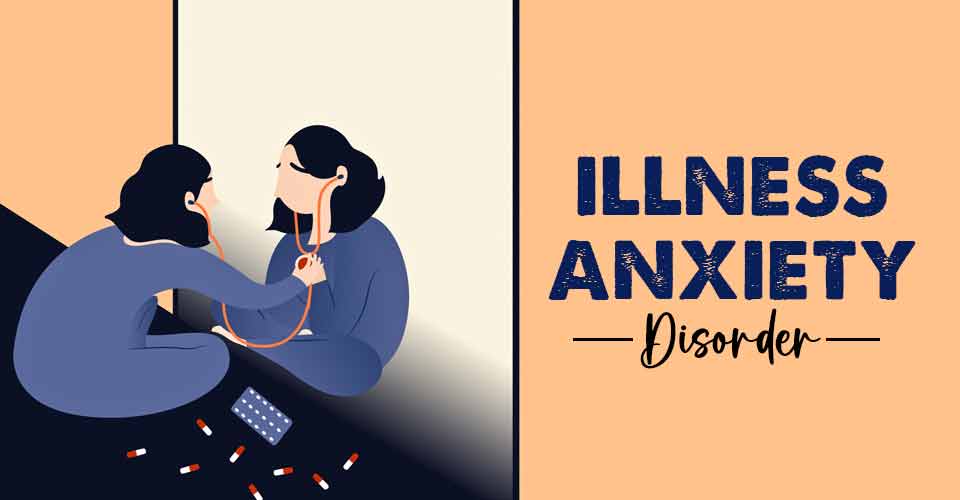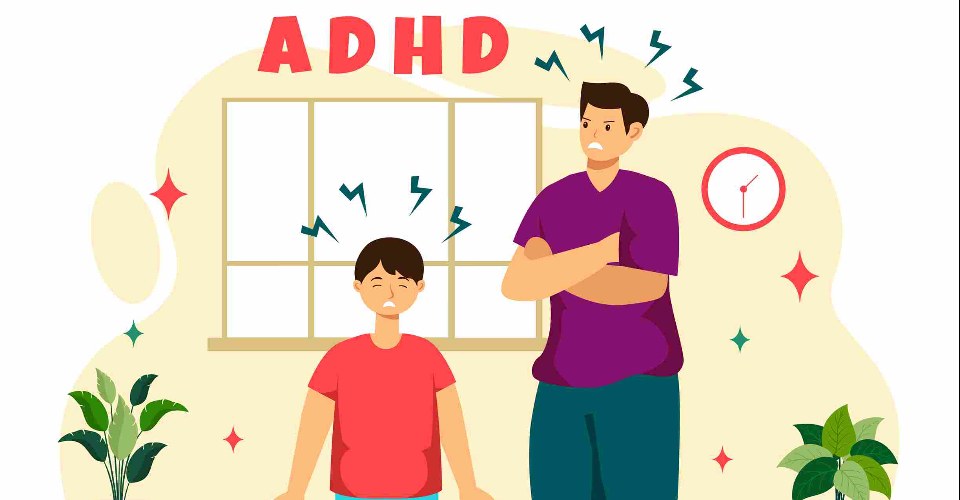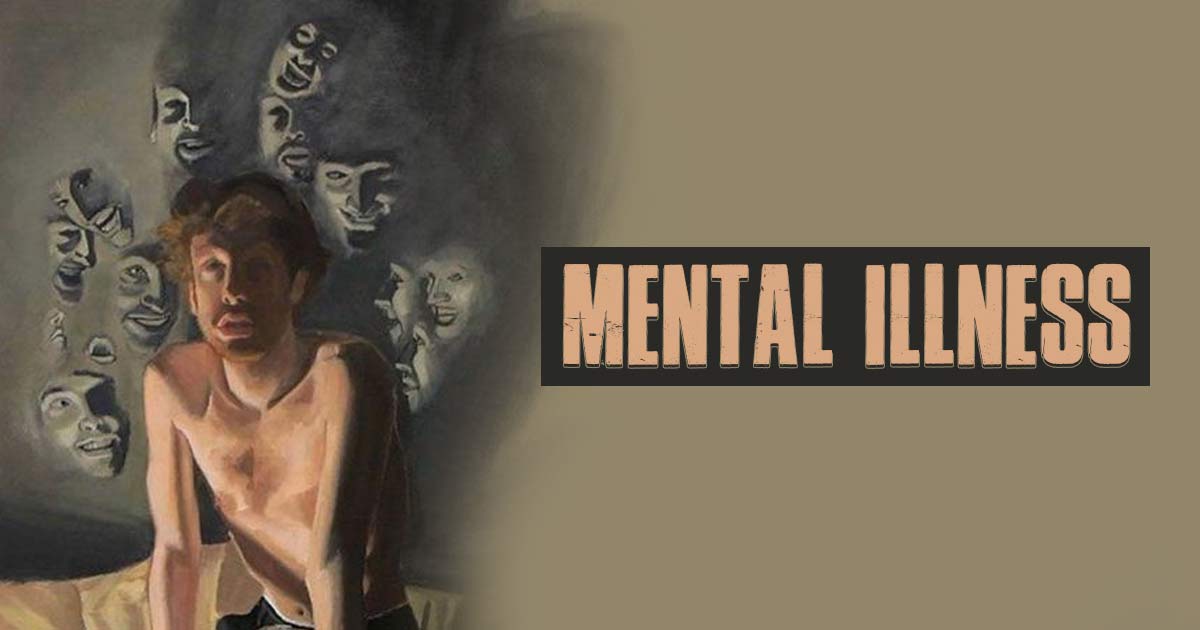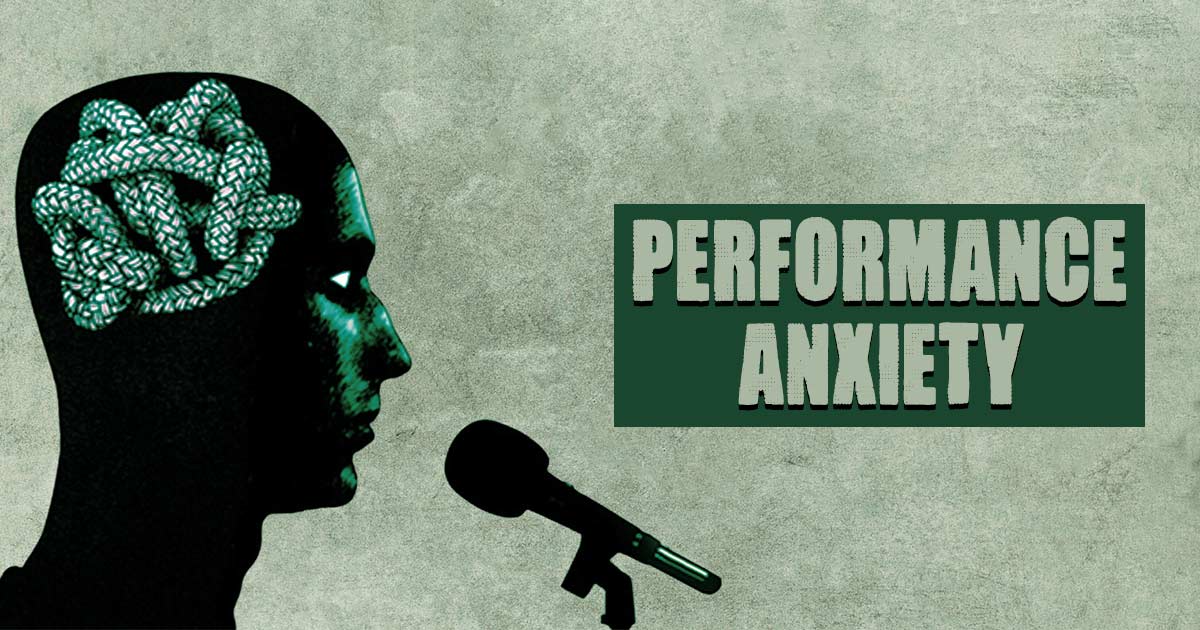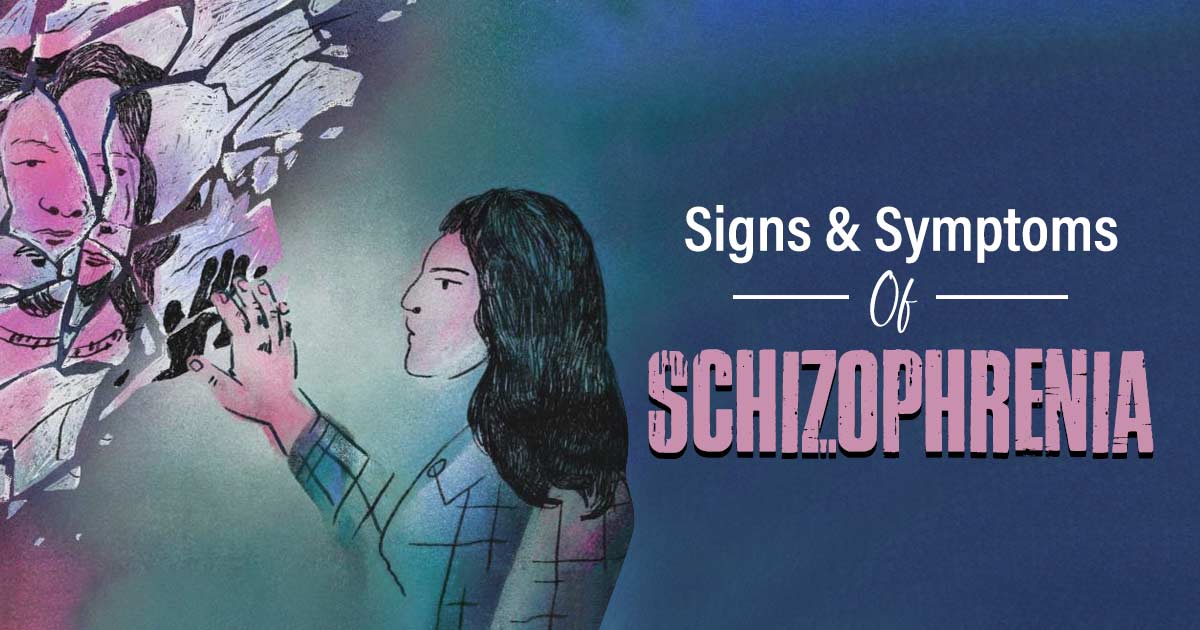If you find yourself constantly checking your body for signs of illness or fearing that you have a serious disease, despite reassurances from doctors, then you may be suffering from Illness Anxiety Disorder (IAD). Learn about this mental health condition and how to manage it for a healthier, more peaceful life.
What Is Illness Anxiety Disorder?
Illness anxiety disorder (IAD) is a psychological condition 1 Scarella, T. M., Boland, R. J., & Barsky, A. J. (2019). Illness Anxiety Disorder: Psychopathology, Epidemiology, Clinical Characteristics, and Treatment. Psychosomatic medicine, 81(5), 398–407. https://doi.org/10.1097/PSY.0000000000000691 wherein a person excessively and unduly worries about suffering from a serious illness. It is formerly known as hypochondria or hypochondriasis. The Diagnostic and Statistical Manual of Mental Disorders (DSM-5) classifies it as a somatoform disorder 2 Substance Abuse and Mental Health Services Administration. (2016, June). Table 3.32, DSM-IV to DSM-5 Illness Anxiety Disorder Comparison. Nih.gov; Substance Abuse and Mental Health Services Administration (US). Available from: https://www.ncbi.nlm.nih.gov/books/NBK519704/table/ch3.t32/ .
People with illness anxiety disorder display a clinical obsession toward their bodies and health. They also have an extreme fear of illness. They frequently and persistently engage in self-examination and self-diagnosis.
This excessive stress from worrying about an illness can occur irrespective of whether they are actually suffering from a medical condition. However, even if a medical condition is detected, the affected people display a disproportionate amount of anxiety around the illness.
This excessive anxiety with or without any serious physical symptom in itself results in severe psychological distress and physical disability that disrupt daily functioning.
Case Example
Neha recently moved to Delhi with her husband due to his new job. At 32 years old, she spends most of her time on household chores. However, throughout the day, after her husband leaves for work, she feels sick and cannot understand the reason. She repeatedly thinks that she has succumbed to some terrible illness.
She has talked to her husband about her concerns and together they went to the doctor for a medical evaluation. However, her reports were unremarkable. She also visited other doctors to cross-check her health symptoms, but they too provided no satisfactory answer.
Frequently seeking assurance from her husband and relatives about her condition, Neha struggles with her thoughts about illness, which interfere with her daily functioning and cause distress.
Case Analysis
It has been evident from the aforementioned case that Neha has a preoccupation with the idea that she may have a serious illness. She is also seen to be experiencing anxiety and mental distress, as well as engaging in care-seeking behavior from other people. All this behavior reflects significant signs of an illness anxiety disorder (IAD).
Illness Anxiety Disorder: Statistics
Illness anxiety disorder is a rare type of mental health condition that is prevalent amongst 0.75–1% 3 French, J. H., & Hameed, S. (2020). Illness Anxiety Disorder. PubMed; StatPearls Publishing. Available from: https://www.ncbi.nlm.nih.gov/books/NBK554399/ of the general population. Among patients who were earlier diagnosed with hypochondriasis, about 25% of patients meet the criteria for IAD.
The condition is typical in adolescents with no gender dominance, and it worsens with age. It is more common in unemployed and less educated individuals. It is more frequent in the third and fourth decades of life.
Symptoms Of Illness Anxiety Disorder
The common 4 French, J. H., & Hameed, S. (2022). Illness Anxiety Disorder. In StatPearls. StatPearls Publishing. Available from: https://pubmed.ncbi.nlm.nih.gov/32119286/ illness anxiety disorder symptoms include:
- Constantly thinking about having or getting a serious health condition
- Interpreting minor symptoms or body sensations as a sign of major illness
- Getting easily frightened with existing health status
- Finding little or no reassurance from doctor visits or negative test results
- Facing excessive distress about possible illnesses, thereby hampering daily functioning
- Frequently checking the body for indications of illness or disease
- Persistently engaging in medical appointments for reassurance or bypassing medical care due to the fear of being diagnosed with a serious illness
- Ignoring people, places, or activities for fear of health risks
- Continuously discussing health and other possible illnesses
- Often navigating through the Internet to look for causes, symptoms or possible illnesses
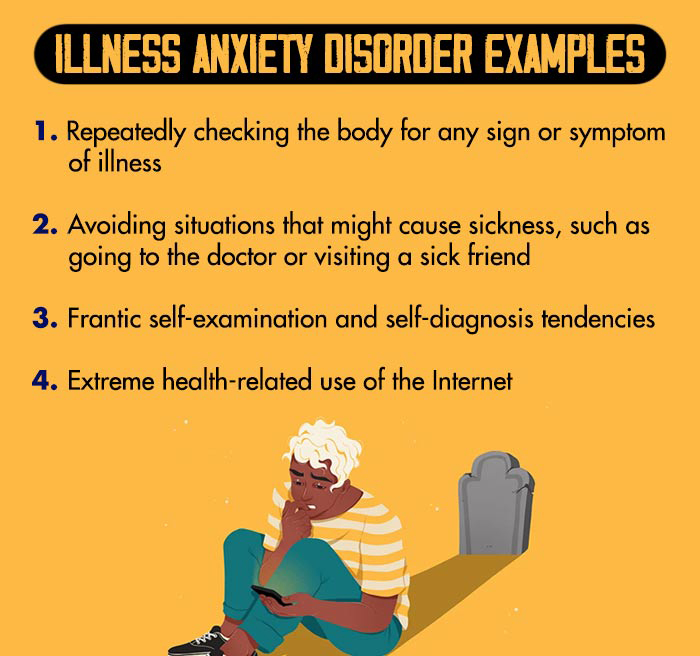
Read More About Anxiety Disorder Here
Types Of Illness Anxiety Disorder
Illness anxiety disorder can be divided into two types 5 French, J. H., & Hameed, S. (2020). Illness Anxiety Disorder. PubMed; StatPearls Publishing. Available from: https://www.ncbi.nlm.nih.gov/books/NBK554399/ :
1. Care-seeking type
People with this type of illness anxiety disorder need constant reassurance about their health. This behavioral pattern is defined by regular visits to the doctor despite tests showing that everything is normal. They may also frequently discuss their symptoms with friends and family members.
2. Care-avoidant type
People with this type of illness anxiety disorder will avoid visiting the doctor for fear of learning bad news about their health. They may also be hesitant to share their worries with their loved ones, because they are afraid that their fears may be confirmed or their apprehensions will not be taken care of.
Health Concern Vs Health Anxiety
Health is a matter of great interest. “Health concern” stands for having cautious and protective thoughts about important health-related matters of oneself or of one’s family. On the other hand, health anxiety is a type of clinical mental health condition 6 Bailer, J., Kerstner, T., Witthöft, M., Diener, C., Mier, D., & Rist, F. (2016). Health anxiety and hypochondriasis in the light of DSM-5. Anxiety, stress, and coping, 29(2), 219–239. https://doi.org/10.1080/10615806.2015.1036243 marked by constant worry and fear of developing a critical illness.
One may also feel extremely consumed by the worries, leading to unmatched distress and disability. In fact, a person who develops illness anxiety disorder goes beyond the conventional level of concern about one’s health and suffers from an extreme obsession with imagined symptoms.
Causes Of Illness Anxiety Disorder
Research 7 Scarella, T. M., Boland, R. J., & Barsky, A. J. (2019). Illness Anxiety Disorder: Psychopathology, Epidemiology, Clinical Characteristics, and Treatment. Psychosomatic medicine, 81(5), 398–407. https://doi.org/10.1097/PSY.0000000000000691 attributes the following as common risk factors for illness anxiety disorder:
- Harboring the irrational belief that all body sensations are severe and predictive of serious illness
- A personal tendency to worry about health
- A family history of anticipatory stress, health anxieties, or other anxiety disorders
- A family history of mental health conditions like depression, mood disorders, etc.
- A history of critical childhood illness
- Witnessing serious illness in the family during childhood
- Persistent stress
- A history of childhood abuse and trauma
- Extreme health-related use of the Internet
Diagnosis Of Illness Anxiety Disorder
The diagnosis of this disorder is carried out in accordance with the DSM-5 diagnostic criteria 8 Illness Anxiety Disorder – Psychiatric Disorders. (n.d.). MSD Manual Professional Edition. Retrieved March 16, 2023, from https://www.msdmanuals.com/en-in/professional/psychiatric-disorders/somatic-symptom-and-related-disorders/illness-anxiety-disorder for illness anxiety disorder. If a person has health anxiety (or other illness anxiety disorder symptoms) for six months or longer—even after tests show an absence of disease—a medical practitioner may diagnose the person with IAD.
The affected person undergoes physical examinations for substance use or any physical ailment. Based on the results, the primary care provider refers the patient to a mental health professional (MHP) who may review the affected person’s symptoms, stressful life situations, family history of mental health disorders, etc.
The patient may also be asked to fill out psychological self-assessments. The MHP carries out a differential diagnosis of the patient’s both physical and mental health conditions and devises a treatment plan accordingly.
How To Treat Illness Anxiety Disorder
The common illness anxiety disorder treatment methods include:
1. Psychotherapy
Psychotherapy is a popular treatment for illness anxiety disorder which is conducted via cognitive-behavioral therapy (CBT 9 Higgins-Chen, A. T., Abdallah, S. B., Dwyer, J. B., Kaye, A. P., Angarita, G. A., & Bloch, M. H. (2019). Severe Illness Anxiety Treated by Integrating Inpatient Psychotherapy With Medical Care and Minimizing Reassurance. Frontiers in psychiatry, 10, 150. https://doi.org/10.3389/fpsyt.2019.00150 ). CBT can help ease the stress levels associated with IAD as it teaches the person the necessary skills that can help manage the disorder. One can avail CBT individually or in a group.
Read More About Psychotherapy Here
2. Pharmacotherapy
If a patient does not respond to psychotherapy, a doctor may recommend medications 10 Chappell A. S. (2018). Toward a Lifestyle Medicine Approach to Illness Anxiety Disorder (Formerly Hypochondriasis). American journal of lifestyle medicine, 12(5), 365–369. https://doi.org/10.1177/1559827618764649 . Antidepressants, such as selective serotonin reuptake inhibitors (SSRIs), are commonly used for treating illness anxiety disorder.
If a person is suffering from mood or anxiety disorder apart from illness anxiety, he/she can also make use of medications to treat the condition. Since some medications have serious side effects and health risks, one must consult his/her doctor and review the treatment options thoroughly.
How To Prevent Illness Anxiety Disorder
Illness anxiety disorder, like any mental health condition, can affect anyone. The serious nature of the illness calls for timely medical attention. However, certain self-help measures can aid recovery for a person coping with illness anxiety disorder.
Consider the following tips 11 Espiridion, E. D., Fuchs, A., & Oladunjoye, A. O. (2021). Illness Anxiety Disorder: A Case Report and Brief Review of the Literature. Cureus, 13(1), e12897. https://doi.org/10.7759/cureus.12897 to address illness anxiety disorder symptoms:
- Educate yourself on IAD. Recognize triggers that make you feel stressed and make you incapable of functioning normally.
- Focus on learning stress management and relaxation techniques (such as progressive muscle relaxation) to reduce anxiety.
- Try to keep busy and stay involved in activities that provide you with support and distraction.
- Avoid the use of drugs, alcohol, or any other substance that can worsen your mental distress.
- Avoid searching the Internet for imagined symptoms of possible diseases.
- Avoid urges of constant self-examination, self-diagnosis, and preoccupation with one’s body.
- Avail the help of a medical professional, if needed.
- Stick to your recommended treatment plan to prevent relapses or worsening of symptoms.
- Avoid consulting multiple doctors or seeking frequent emergency room visits as it will only make your treatment harder.
Takeaway
Early referral for psychiatric evaluation can improve the prognosis for individuals with illness anxiety disorder, compared to those who only receive general medical care. Patient education can also be an effective tool in preventing the development or worsening of illness anxiety disorder.
By educating patients about the nature of the condition, as well as healthy coping mechanisms and strategies for managing symptoms, healthcare providers can help individuals with illness anxiety disorder achieve better outcomes and improve their quality of life.
At A Glance
- Illness anxiety disorder is a mental health condition in which a person constantly thinks or fears the development of a serious illness.
- Illness anxiety disorder was formerly known as hypochondriasis.
- Its symptoms include a clinical obsession with one’s health and a chronic fear of developing a critical health condition.
- The common illness anxiety disorder causes include traumatic experiences, childhood abuse, a family history of mental health conditions, etc.
- The treatment for illness anxiety disorder entails therapies, medication, and self-help coping strategies.
Frequently Asked Questions (FAQs)
1. Who are some famous people with an illness anxiety disorder?
Florence Nightingale, Adolf Hitler, Tennessee Williams, Charles Darwin, and Hans Christian Andersen are some of the famous personalities who might have suffered from an illness anxiety disorder.
2. What is the difference between illness anxiety disorder and somatic symptom disorder?
Somatic symptom disorder is any mental disorder that manifests as physical symptoms that suggest illness or injury, but cannot be explained medically. Unlike somatic symptom disorder, a person with illness anxiety disorder generally does not experience symptoms of a medical condition.
3. What is the difference between illness anxiety disorder and conversion disorder?
Conversion disorder is a neurological condition in which the symptoms affect a person’s perception, sensation, or movement with no evidence of a physical disorder. Unlike conversion disorder, a person with illness anxiety disorder generally does not experience symptoms of a medical condition.
4. Does illness anxiety disorder go away?
Illness anxiety disorder, with time and after a successful medical checkup, may eventually go away. However, for some people with chronic illness anxiety disorder, it takes a lot of time to recover from the condition.
5. What triggers illness anxiety?
Experiencing a period of major life stress or a threat of a serious illness can trigger illness anxiety.

